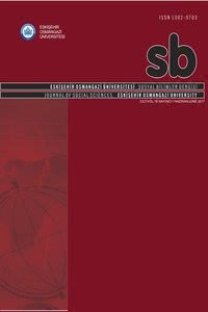KÜMELEME ANALİZİ İLE TÜRKİYE VE AB ÜLKELERİNİN BEŞERİ SERMAYE GÖSTERGELERİ AÇISINDAN KARŞILAŞTIRILMASI
Bu çalışma, beşeri sermayenin bileşenleri olan eğitim ve sağlık ile işgücü piyasalarına ilişkin göstergeler açısından Türkiye ve AB üyelerinin bir karşılaştırmasını yapmaktadır. Bu karşılaştırma Türkiye’nin AB’ye tam üyelik sürecinde demografik yapısının fırsat veya tehdit oluşturacağı tartışması açısından önemlidir. Eğitime (6), sağlık (7) ve işgücü piyasalarına (10) ilişkin toplam 23 değişken analizlere katılmış ve kümeleme analizi ile Türkiye bu göstergeler açısından AB üyesi ülkeler ile karşılaştırılmıştır. Yapılan analizlerde her üç alan (eğitim, sağlık ve işgücü) için, Türkiye’nin eski ve yeni üyelere benzemediği ortaya çıkmıştır. Bu ampirik sonuçlar, Türkiye’nin beşeri sermaye potansiyeli açısından AB için bir fırsat olacağı düşüncesini yeterince desteklememektedir. AB’nin geleceği açısından beşeri sermayesinin niceliği kadar niteliğinin de önemli olduğu unutulmamalıdır. Bu nedenle müzakere sürecinin devam ettiği dikkate alınırsa, Türkiye’nin bu alanlarda kapsamlı bir reform sürecine girmesi, bu reformlarla sahip olduğu beşeri sermaye potansiyelinin niteliğini hızla iyileştirmesi ve halen tehdit oluşturma potansiyeli olan bu konuyu fırsata dönüştürmesi gerektiği açıktır
Anahtar Kelimeler:
Beşeri Sermaye, Avrupa Birliği, Kümeleme Analizi
A COMPARISON OF TURKEY WITH THE EU IN TERMS OF HUMAN CAPITAL INDICATORS THROUGH CLUSTER ANALYSIS
This paper compares Turkey with the EU countries in terms of compositions of human capital (education and health) and labour force indicators. This comparison is very important in the sense that the potential for human capital of Turkey may be an opportunity as well as a threat in the process of the EU membership. A total of 23 indicators including education (6), health (7) and labour force (10) are used in the research to compare Turkey with EU through cluster analysis. The results obtained by a comparison for each of the three group of indicators reveal that Turkey constitutes a separate cluster and does not resemble any member country. These empirical results do not support the view that Turkey’s potential for human capital does create an opportunity in the future of the EU. It must be kept in mind that for the EU the quality of human capital is as important as quantity of that. For this reason, as far as the negotiation process is concerned, Turkey should carry out a comprehensive reform in these areas and quickly improve the quality of her human capital to transform a potential threat to an opportunity.
Keywords:
Human Capital, European Union, Cluster Analysis,
- Başlangıç: 2000
- Yayıncı: -
Sayıdaki Diğer Makaleler
Kübizm'de yüzeyin çizgisel düzenlemesi
2001 EKONOMİK KRİZİNİN TÜRKİYE SANAYİ SEKTÖRÜ ÜZERİNDEKİ NET KRİZ ETKİSİNİN ANALİZİ
Bahar Berberoğlu, Bahar BERBEROĞLU
NASREDDİN HOCA FIKRALARINDA KÜLTÜREL UNSURLAR
KÜBİZM’DE YÜZEYİN ÇİZGİSEL DÜZENLEMESİ
Bülent ÖZ, Muhsin KAR, Sami TABAN
Nasreddin Hoca fıkralarında kültürel unsurlar
Türkiye'de carry trade yatırım stratejisi ve belirleyicileri arasındaki ilişki : 2001-2007
KÜRESEL ENERJİ POLİTİKALARI VE TÜRKİYE: PETROL VE DOĞAL GAZ KAYNAKLARI AÇISINDAN BİR KARŞILAŞTIRMA
Kırım Hanlığı şer'iy ye sicilleri'nde yer alan avarız ve para vakıfları üzerine
